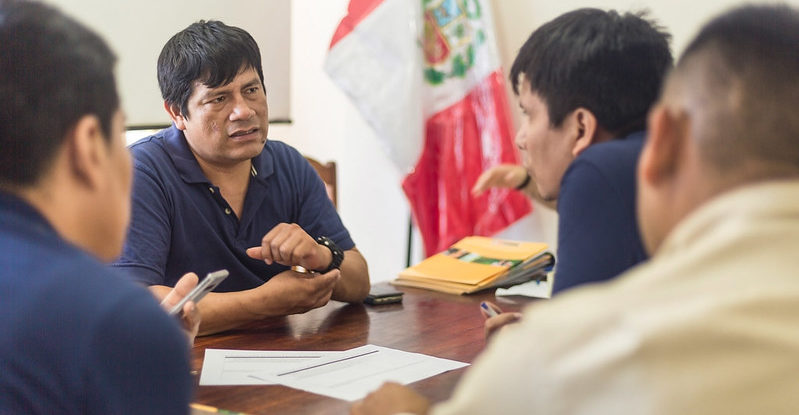
Gathering a diverse group of people together — with various vested interests — to discuss how to best manage a specific landscape has gained traction in recent times as the primary way to ensure voices are heard and problems are addressed in an equitable manner.
But exactly how equitable and effective are these multi-stakeholder forums?
That’s what a group of researchers led by scientists with the Center for International Forestry Research and World Agroforestry (CIFOR-ICRAF) set out to discover. The findings from a project they led in Brazil, Ethiopia, Indonesia and Peru from 2018 to 2020 were recently published in a series of seven journal articles in the International Forestry Review.
“We wanted to determine whether multi-stakeholder forums are really designed — or even intended — to promote equity, or just to tick a box on ‘participation’ without really addressing differences in power and voice for people living in and around forests,” said Anne Larson, who led the team. “That is, given how much past experience there is on this topic, are people doing things better now? Has anything changed?”
The forums studied were designed as “invited spaces” to bring different people and interests to the table, but they often failed to consider how best to address the inequalities people face, according to one of the research papers, which gathered evidence from various countries. They also often failed to factor in unsustainable local development and political priorities.
In spite of these problems, participants usually considered them to be useful. The collection of studies in the International Forestry Review offers a variety of insights influenced by history and context, aimed at improving multi-stakeholder processes and outcomes.
In Ethiopia, researchers learned from two case studies that gender inequity challenged effective outcomes and that quotas were not particularly useful. The cases also suggested the importance of both bottom-up and top-down strategies, with the cautious engagement of government as critical to ensure success in community forest management.
A survey of three multi-stakeholder forums in Indonesia found that the historical relationships between participants strongly influenced what was needed in terms of leadership. Although conflicting stakeholder interests can hinder trust-building, a leadership strategy based on understanding and building on past relationships can help improve collaboration.
In Peru, one study considered a multi-stakeholder forum — roundtable — designed to address lengthy delays in the creation of five reserves contributing to the “Protection of Indigenous Peoples in Isolation and Initial Contact.” Research revealed a key lesson for multi-stakeholder forums seeking to responsibly engage with the rights of vulnerable populations, recognizing that rights are not negotiable. It also demonstrated that forums must be designed so that participants collaborate to identify challenges to rights from different levels, stakeholders and discourses, learn from those challenges, and design solutions and recommendations to address them.
Another paper explored Peru’s Amarakaeri Communal Reserve, a protected natural area in the Amazon that includes a hard won multi-stakeholder forum in its governance structure, representing important rights gains for Indigenous peoples. Yet the forum, currently made up of Indigenous communities, the state, and NGO allies, excludes Andean migrants. Not only does it raise concerns about the role of multi-stakeholder forums in relation to protected areas, but it pinpoints the challenges around access to participation.
In the eastern Brazilian Amazon state of Pará, the Green Municipalities Program multi-stakeholder forum – designed to combat deforestation – was found to fall short of its objectives. Researchers learned that the forum favored more powerful participants, which meant that social injustices driving deforestation were overlooked. Instead of prioritizing the drivers of deforestation, participants focused on the effects, which left the socio-political institutions driving both deforestation and social injustice unchallenged.
Research into territorial planning in the Brazilian states of Acre and Mato Grosso examined ecological zoning processes showing how networks, relationships, and historical and social contexts can affect multi-stakeholder forums. It demonstrated that both multi-stakeholder forums and land-use planning must be recognized in theory and in practice as political processes that have to negotiate context, power relations, and community diversity, rather than as technical tools for implementation.
“We are aware that multi-stakeholder forums are here to stay and will continue to be promoted at different levels,” said Juan Pablo Sarmiento Barletti, who co-coordinated the global study. “This collection of articles is proof that to get closer to transformational change, we need forums that do more than simply bring people to the table.”
Responding to this challenge, the seven articles provide important lessons for more equitable and effective forums. To support these lessons, the research team and local partners developed a toolkit to support multi-stakeholder landscape management.
The research supported by this work was undertaken as part of the CGIAR Research Programs on Policies, Institutions, and Markets (PIM) led by the International Food Policy Research Institute (IFPRI), and Forests, Trees and Agroforestry (FTA) led by CIFOR. Both are supported by the CGIAR Fund Donors. It was carried out as part of a comparative study of subnational MSFs in Brazil, Ethiopia, Indonesia and Peru, part of CIFOR’s Global Comparative Study on REDD+.
We want you to share Forests News content, which is licensed under Creative Commons Attribution-NonCommercial-ShareAlike 4.0 International (CC BY-NC-SA 4.0). This means you are free to redistribute our material for non-commercial purposes. All we ask is that you give Forests News appropriate credit and link to the original Forests News content, indicate if changes were made, and distribute your contributions under the same Creative Commons license. You must notify Forests News if you repost, reprint or reuse our materials by contacting forestsnews@cifor-icraf.org.